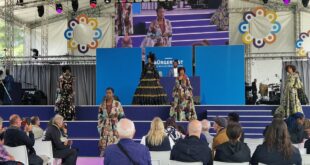After years of protests led by the Black community and their White German allies, a square and a street in the African Quarter in Berlin-Wedding were renamed on Friday. Both had bore the names of German officials who were in the forefront of Germany’s colonisation of East Africa in the 1880s and 1890s, often employing brutal military force.
The former Nachtigal Square, for Gustav Nachtigal who played a leading role in German colonial activities in Togo, Cameroon and Namibia, has now become Manga Bell Square, in honour of the Douala royal couple, Rudolf Duala Manga Bell and his wife, Emily, who fought against German colonial rule in Cameroon.

Manga Bell, who was partly educated in Germany, fought against forced labour when he returned to his homeland. Alongside about 100 other people, he was executed by the German colonial administration on 8 August 1914 for leading the resistance against the German colonial power. His wife Emily Douala Manga Bell (1881-1936) was also an anti-colonial activist and she fought bitterly against the execution of her husband.
Lüderitzstraße, for Adolph Lüderitz, founder of the German-Southwest Africa colony (now Namibia), on the other hand was renamed after Cornelius Fredericks, a resistance fighter against German colonial rule in Namibia.
Fredericks, who led the Nama resistance against the genocidal war waged against the Hereros and Nama by German colonial forces, died of malnutrition and hypothermia on 16 February 1907 during his imprisonment in a German concentration camp.

The new street signs were unveiled in the presence of the ambassadors of Cameroon and Namibia as well as King Eboumbou of Douala and his wife.
Christian Kopp, whose organisation Berlin Postkolonial has been a key part of the struggle for the change of the street names for more than two decades, welcomed the renaming.
READ ALSO Berlin to make renaming of streets with colonial names easier
“We are very happy that the honouring of the founders of German colonies in Africa has now come to an end and that instead the resistance of the people from today’s Cameroon and Namibia [against colonialism] is being honoured in the African Quarter,” the German historian and activist, who is also a member of Decolonize Berlin, said.
“Street names are tributes and part of the culture of remembrance,” said District Mayor Stefanie Remlinger (Greens). “Therefore, it is an important task to erase names from Berlin’s streetscape that are associated with crimes of German colonialism.”

The events of Friday is a major victory for efforts to change the memory culture in Germany as it relates to its role in the colonisation of the African continent. Activists have always pointed out that naming public spaces after persons who participated in the colonial enterprise trivialises colonial injustice.
The district council of Wedding had decided in April 2018 to Petersallee, Lüderitzstraße and Nachtigalplatz in honour of African liberation fighters. Petersallee is named for Carl Peters, the founder of the colony of German East Africa – today’s Tanzania, who is considered one of the most brutal German colonial officials in Africa.
Berlin played a major role in European colonisation of Africa. It was in the city that the Berlin Africa Conference took place, where the continent was partitioned among the imperial powers and the borders of today’s African countries were arbitrarily drawn. The infamous conference, which began on 15 November 1884 under the chairmanship of Chancellor Otto von Bismarck and ended on 26 February 1885, sparked the colonial activities in the continent.
READ ALSO Berlin launches project for reappraisal of German colonial history
 THE AFRICAN COURIER. Reporting Africa and its Diaspora! The African Courier is an international magazine published in Germany to report on Africa and the Diaspora African experience. The first issue of the bimonthly magazine appeared on the newsstands on 15 February 1998. The African Courier is a communication forum for European-African political, economic and cultural exchanges, and a voice for Africa in Europe.
THE AFRICAN COURIER. Reporting Africa and its Diaspora! The African Courier is an international magazine published in Germany to report on Africa and the Diaspora African experience. The first issue of the bimonthly magazine appeared on the newsstands on 15 February 1998. The African Courier is a communication forum for European-African political, economic and cultural exchanges, and a voice for Africa in Europe.


































